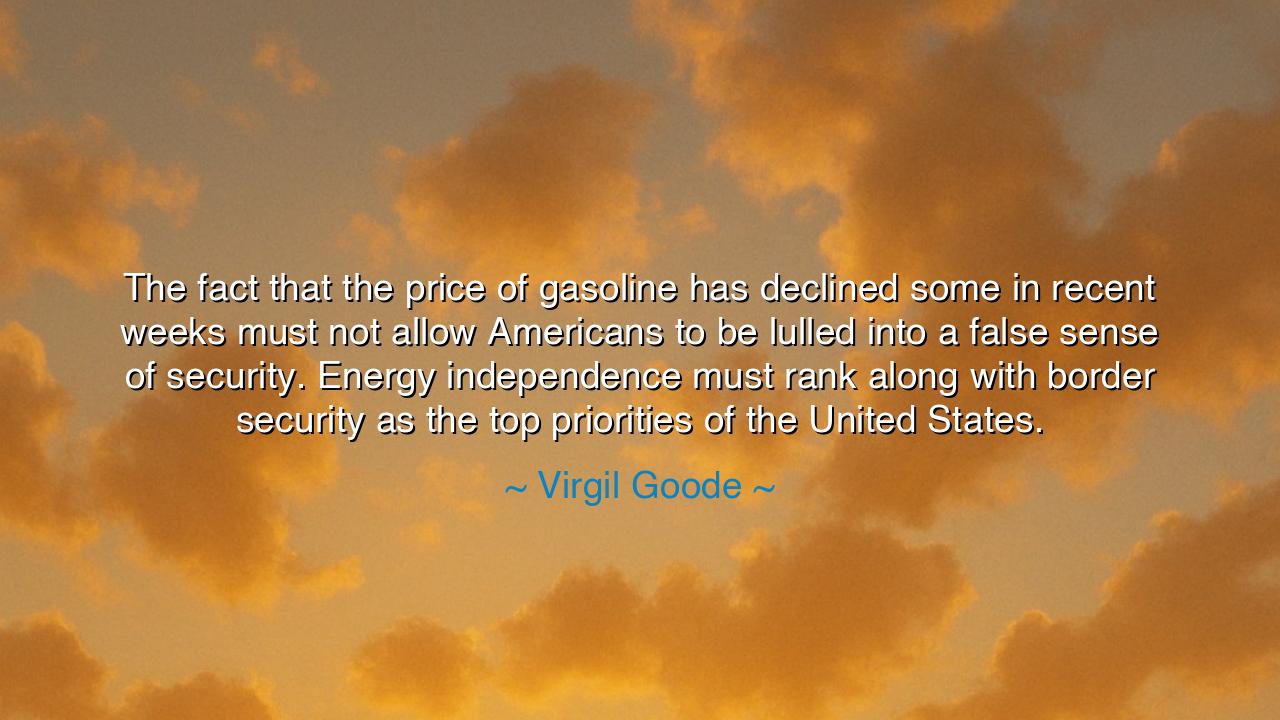
The fact that the price of gasoline has declined some in recent
The fact that the price of gasoline has declined some in recent weeks must not allow Americans to be lulled into a false sense of security. Energy independence must rank along with border security as the top priorities of the United States.






When Virgil Goode spoke the words, “The fact that the price of gasoline has declined some in recent weeks must not allow Americans to be lulled into a false sense of security. Energy independence must rank along with border security as the top priorities of the United States,” he was warning his countrymen of a danger more subtle than any army — the danger of complacency. His message was not simply about fuel or commerce, but about the eternal vigilance required to preserve a nation’s strength. For Goode, the temporary relief of falling gas prices was a fleeting comfort, a mirage that could blind a people to the deeper truth: that dependence, whether on foreign energy or foreign will, is the first step toward decline.
The origin of this quote lies in the early twenty-first century, when America faced the twin challenges of economic instability and global unrest. Gasoline prices, driven by the turbulence of world markets, rose and fell with alarming speed. Each decline was greeted with sighs of relief, but Goode — a congressman known for his blunt patriotism — saw in that relief a perilous forgetfulness. He urged his nation to see beyond the moment, to understand that true security is not measured by the price at the pump, but by the ability to stand self-sufficient and unshaken when the world trembles. His words joined a long chorus of American voices calling for energy independence — not as a slogan, but as a foundation of freedom.
In this, Goode echoed a truth as ancient as civilization itself: that no people can be truly free if they depend on others for the means to live. The great empires of the past learned this too late. The Romans, who once ruled the known world, became dependent on the grain of Egypt to feed their citizens; when that lifeline faltered, the empire began to starve from within. The Ottomans, who controlled the crossroads of trade, grew fat on foreign tribute and forgot the virtues of industry and toil. Goode’s warning, though spoken in modern language, carries the same ancient wisdom: that comfort without vigilance breeds weakness, and dependence without foresight leads inevitably to collapse.
He also linked energy independence to border security, showing that both are forms of the same truth — sovereignty. A nation’s borders define its body, but its resources sustain its soul. To leave either unguarded is to invite conquest, whether by armies or by circumstance. The ancients guarded their walls against invaders, but the wise among them also guarded their granaries and wells. In our age, oil, gas, and energy are those lifelines. To neglect them is to surrender power not by force, but by indifference. Goode’s voice, therefore, is that of the sentinel — calling from the ramparts of history, urging his people not to sleep while the fires of the world still burn.
Consider, for example, the crisis of the 1970s, when oil embargoes left the United States gasping for breath. Lines formed at fuel stations; tempers flared; the mightiest industrial nation on Earth found itself at the mercy of distant rulers and unstable markets. That moment of weakness taught a bitter lesson — that dependence can be as dangerous as invasion. Yet with time, memory faded, and convenience took its place. Goode’s words seek to awaken that sleeping memory, to remind his people that security is not granted by markets, but earned by discipline, innovation, and foresight.
His warning also carries a moral weight. To be lulled into false security, he implies, is not only a national danger but a spiritual one. When people grow too accustomed to comfort, they forget the virtues of preparation and sacrifice. The ancients would have called this the sin of hubris — the belief that prosperity will endure simply because it has before. But history, ever the stern teacher, shows that those who fail to guard their independence lose it, first in small measures, then all at once.
So, my children of the modern age, hear this teaching and take it to heart: comfort is not safety, and ease is not strength. Whether you build a nation, a household, or a soul, do not mistake temporary peace for lasting security. Work while the days are calm, that you may stand firm when the storms return. Seek independence not only in energy, but in thought, in spirit, and in will. Let no passing decline in price or struggle in fortune make you forget the deeper purpose — to live as a people who can provide, defend, and sustain themselves. For as Virgil Goode reminds us, security without vigilance is illusion, and freedom without self-reliance is but a dream that fades with the dawn.






AAdministratorAdministrator
Welcome, honored guests. Please leave a comment, we will respond soon